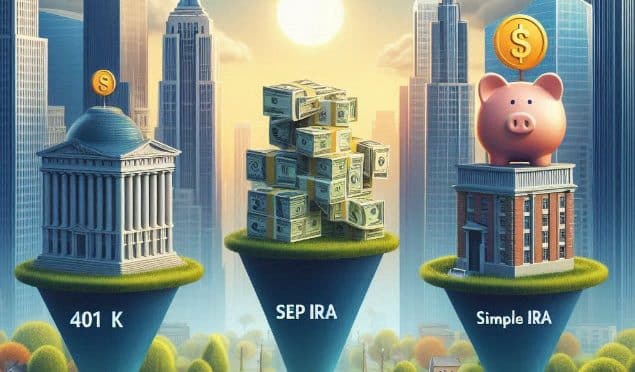Let's Get Started
You'll get the most value from financial planning if your specific goals and needs match a firm's philosophy and services. Let's learn more about each other.
Ready to Get Started?


Solo 401(k)s usually offer the highest savings potential for business owners without employees.
SEP IRAs are simple but less flexible, and require equal contributions for all employees.
SIMPLE IRAs work for very small teams, but have lower contribution limits and stricter rules than 401(k)s.
If you have a small business and are looking to save in a tax advantaged way for retirement, there are a lot of options for retirement plans. The 3 most popular options are Solo 401ks (or sometimes called individual 401ks or i401ks), SEP IRAs, or Simple IRAs. What are the pros and cons of each of these plans, and which one is right for you?
If you are a single owner and have no other employees (you can still have a spouse involved in the business though!), you are eligible to create a Solo 401(k) plan.
In general, we find solo 401ks to often be the best choice. They are very easy to administer, can be managed for little to no fees at large custodians like Schwab, Vanguard, or Fidelity, and they allow you to be able to save a lot of money.
If you have other employees, you still have great options. SEP IRAs and SIMPLE IRAs are still available to you, however solo 401ks are not. However there are very affordable options to set up 401(k)s that we usually find to be better options than SEPs or SIMPLE IRAs.
Let’s get into the details on why we believe 401k plans tend to be the best option:
One of the best features of a solo 401k is the amount of money you are able to put into them. This amount changes each year with inflation, but for 2023 it is $66,000! That limit is made up of 2 different contribution amounts; elective deferrals, which come “from the employee” and employer contributions, which from “the business”:
While SEP IRAs technically have the same contribution limit as solo 401ks, contributions to the SEP can only be made by the company, and contributions amounts are still limited to 25% of compensation. This makes it more difficult to reach that maximum contribution amount when compared to a solo 401k.
If you have employees, there is an additional rule with SEPs that you should be aware of. With a SEP, you must contribute the same percentage of salary for each employee. SEPs tend to be not as popular with small businesses because employees can not do their own contributions, and they are harder to max out than 401ks.
If you are self employed and have no employees, solo 401ks are a much better option than SIMPLE plans. Both plans can be set up with little to no administrative fees, but 401ks allow for more money to be contributed.
Where SIMPLE plans may be popular is with a small business that wants to offer a very basic plan to employees. However because of the rules with SIMPLE IRAs, contributions from the business are restricted to just 3% of salary, and the limit that employees can save is substantially lower than what they could save into a 401(k).
SIMPLE plans also have additional penalties for employees if they withdrawal, or rollover, their contributions before they are eligible.
While finding the best retirement plan for your business is important, this is just your first decision to make around retirement planning.
How will you manage the investments in the plan? Should you have in pre-tax 401 or Roth? How much do you need to save to reach your retirement goals?
Small business retirement plan are complicated, and creating a financial plan around your business ownership is even more complex. If you are considering the best options to use your business to help you save for retirement, like a 401k, see how we help other business owners just like yourself. Schedule a free 30-minute call today.
Matt worked for the Department of Defense as a material scientist before changing careers to follow his interests in personal finance and investing. Matt has been quoted in The Wall Street Journal, CNBC, Kiplinger, and other nationally recognized finance publications as a flat fee advisor for Arnold and Mote Wealth Management, a flat fee, fiduciary financial planning firm serving individuals and families in Cedar Rapids and surrounding areas. He lives in North Liberty, where you will likely find him, his wife Jessica, and two kids walking their dog on a nice day. In his free time Matt is an avid reader, and is probably planning his next family vacation.